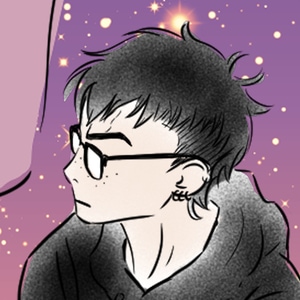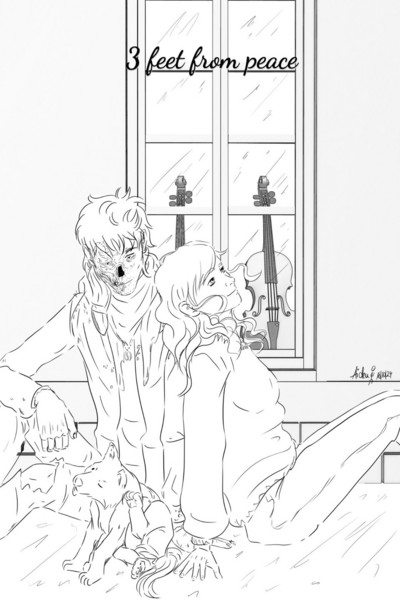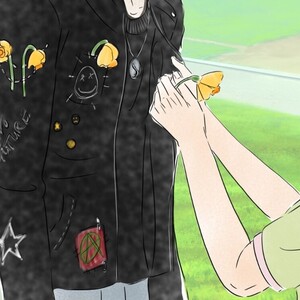The cold bites into Erik's skin like sharp needles as he fights his way through the crowded city center. The evening has wrapped the city in a gray, gloomy light, and the wind blows mercilessly into his face. The people around him hurry in their thick coats, their heads pulled deep into their collars. Shopping bags rustle, boots click on the wet asphalt. Some bump into him without even acknowledging his presence, as if he were an invisible obstacle. The gaze of a man meets his, full of disdain. A brief flicker in his stomach. Erik feels the weight of rejection, but he keeps moving. Every step hurts, every breath gurgles in his bronchi.
His teeth chatter as he inhales. Despite the thick scarf and the surgical mask, the air feels sharp, as if he's sucking ice into his lungs. He can barely bear the pain in his head. It's not just the sharp cold pain drilling into his temples, but also the dull, oppressive hunger that tortures him. The lack of water makes his mouth dry and his tongue fuzzy. Perhaps it's also the exhaustion that has settled into his bones.
Maybe it's just everything together.
Time seems to blur as he stumbles through the streets, through the cold evening. Winter has a firm grip on the city, and he has nothing to protect him from it.
Finally, he reaches the alley behind the city's old shopping center. It's a sad, forgotten place where the city's homeless seek shelter when the emergency shelters are full. Covered, but not safe. Everywhere, the smell of decay, urine, mold. The walls are damp, and the cold wind whistles through the cracks. It's not a refuge, not a safe harbor. It's a place of survival. And even this place has its rules. But it's the only place where he can find some peace for a few hours.
"Hey, this is the piss spot!" grumbles a man with a thick, scruffy beard and a dirty coat. Erik shrugs and replies without looking at the other man, "Not anymore." The man mumbles something unintelligible, but Erik ignores him and spreads out the cardboard he brought with him. The air is thick with the smell of urine, mold, and trash, but this is still better than sleeping under the stars, where the wind turns everything to ice. Sasha sniffs curiously around the area. The sleeping mat Erik found a few days ago in a pile of discarded items looks worn, its edges chewed up, but it will offer him a little protection, a little stability. It's no luxury, but it will keep the cold at bay—at least a little. He places his faithful sleeping bag on top of the mat, sits down on his makeshift bed, and looks around.
Erik closes his eyes and tries to block out the pain in his feet, which are numb from the wetness and stiff from the cold. His socks are soaked, the cold seeping deep into his bones. It painfully reminds him of his first year on the streets, when he nearly lost a toe to frostbite. Back then, he hadn’t yet learned the simple rules: Never let your socks get wet, change them immediately, no matter what. He pulls off his damp socks and looks at his feet. The cold has nearly paralyzed them, his toes pale and stiff. A sharp pain shoots through his feet as he finally puts them back into dry socks, which he found in some charity donation bin. Shivering, he slips his feet back into his boots, ties them up, throws the wet socks into his backpack, and uses it as a pillow. Another painful lesson learned.
Never take your eyes off your backpack!
Sasha sniffs around him, curiously watching as Erik bundles himself into his sleeping bag. "Come here, little lady," he murmurs, and the dog snuggles up to him, burying her cold nose in the curve of his neck. He slides deeper into his sleeping bag, listening to the constant sound of the wind whistling against the walls of the courtyard.
The sleeping bag blocks most of the cold, but the stone floor beneath him is relentlessly hard. There's no softness, no give. Only the cold, which penetrates through the floor into his back, and the wind that rushes past the corners of the roof, cutting through with icy force and stinging his face.
His thoughts blur in the darkness. There's no escape, no warm bed he could wish for. No place where he would feel safe. Life has cast him aside, like an old, torn coat that no longer has any use. This is winter at its harshest – not just outside, but inside. It's the feeling of abandonment, the sense of being forgotten by the world.
He knows he isn't really safe here. Danger lurks everywhere: drunken teens who prey on the sleeping, other homeless people who steal the few belongings you’ve managed to hang onto. He hears the faint murmur of an argument between two other homeless people, arguing over the lack of things. A soft whimper, a curse. Then a swift movement, a sound—maybe a punch.
He knows he won't sleep. Not really. Not here, not on this ground. The sleeping bag offers him no comfort. The pain in his back, the stabbing in his feet—all of it blends with the cold and the loneliness that dwells in every fiber of his being. It’s not peace he finds, only a constant waiting for the next morning, the next step, the next day, which will be just as gray and cold as the last.
He curls deeper into the sleeping bag, clinging to one of the few things he has left—the warmth of Sasha, the closeness of the small, defenseless creature that gives him more comfort than any human contact.
Sometime in the night, as sleep almost slips into a nightmare, he’s woken by the proximity of a man. The guy is big, stocky, with a three-day beard and a deep, gravelly voice. "Got a light?" he asks. Erik blinks into the dark, the cold biting at his bones. "No, I don’t smoke," he murmurs, gesturing with a brief nod toward the group at the edge of the courtyard, where a few men are sitting. The stocky man silently retreats, and Erik turns back around, sinking once again into the cold and the noise of the street.
It doesn't get better.
It will never get better.
As dawn breaks, Erik wakes again, half-frozen, half-tormented. Sasha rolls out of the sleeping bag, takes a few steps to relieve herself. Erik can still feel the warmth of the dog, but even she can’t chase away the icy grip that clutches at him.
The day hasn’t truly begun, but Erik already feels at the end of his strength. Every muscle aches, each movement drags like a heavy, sluggish pull. The smell of urine and mold clings to his skin. He looks around at the others, still lying in their sleeping bags or slowly rising from their cardboard boxes. They’re all just as abandoned, just as forgotten, just as aimless. There is no escape. The nights grow colder. But Erik must keep going. Must fight through the day, must fight through life, even though he knows there is no place for him. Not here, not anywhere.
Sasha trots happily over to her owner, who scatters a handful of dry food on the ground. It’s a small morning ritual: as soon as the pup comes back without hesitation, she gets a snack. Erik watches her eagerly gulping down the kibble. Only then does he struggle to get out of the sleeping bag. With a groan, he stands up, stretches, but his muscles protest. A brief dizziness overtakes him, and he grabs the wall to steady himself. He runs a hand over his neck and massages the aching spot. He packs up the sleeping bag and mat, throwing the backpack over his shoulder. It’s time to disappear before the others become more active. Before the day ruins the last flicker of a chance for some rest. But even that won’t last long.
The place leaves an unpleasant scent on his skin—the smell of being lost, of desperation. A scent that will never fully leave him.
A short walk brings Erik in front of the Paganino. He knocks, and no sooner has he pulled his hand back than Gustave, as usual, opens the door. But the familiar smell of the backyard—the awful mix of urine and decay—hits the violin maker immediately, even before he can greet the young man. Gustave holds his forearm to his nose and steps aside.
“Uhm... I am... sorry....,” Erik murmurs quietly as he passes him, keeping his head down.
“Go upstairs,” Gustave grumbles briefly, nodding with a quick glance toward the stairs. “I’ll handle it down here. Go on, Pojke.”
Erik only nods, murmuring a quiet “Thanks.” He hurries up the stairs, which seem steeper and longer than usual this morning, and he disappears into the bathroom. As the door above closes, the violin maker stands for a moment, shaking his head. The stench lingers in the air.
It’s hard to fathom how much a person can endure.
A few minutes later, just in time for shop opening, Gustave hears Erik’s footsteps coming down the stairs. He enters the room, Sasha by his side, happily hopping up and down. Erik looks the same as always, but he’s wearing fresh clothes—the first time in days. His hair is still damp. Even though his body may still carry the chill from the night, he now smells of soap and warm mint tea.
The clothes he’s wearing tell their own story: an old, worn-out shirt, probably from the charity donation bin, too short for him. Over it, he wears a zip-up sweater with a broken zipper, and then the pants—one of Gustave’s. They hang on him like a tent on a thin pole. Without the makeshift "belt" made of a shoelace, they would probably fall off with the first step he takes.
He knows he looks ridiculous—he feels it himself—but neither Gustave nor Christine makes any remarks about his clothing. They say nothing, because there’s nothing to say. It’s all he has.
Gustave looks at him appraisingly as he hands him another steaming cup of mint tea. "What’s your plan for today?" he asks, sipping his coffee, his eyes still on Erik. The punk takes off the mask to inhale the hot steam of the tea with a deep, rough breath, then gently blows across it. “Well, I’ve got three repairs today... nothing crazy..." Erik murmurs as he accepts the handkerchief Gustave casually offers him. He wipes his upper lip with it, instinctively, almost mechanically. Lately, his nose keeps leaking, and each time it happens, he feels a moment of humiliation. With a quick cough, he stuffs the handkerchief into the pocket of his oversized pants and takes a long sip of the hot tea.
"Fine fine," grumbles Gustave, nodding. Then his brow furrows slightly. "You don't look good, Pojke," he murmurs, but without reproach."I never look good..." Erik responds almost apologetically, his gaze lowered. It's a remark that’s almost become a habit, one he drops again and again because he knows it’s true. But Gustave is about to say something when the small bell on the front door rings.
Erik jerks around, hastily pulling the mask over his withered nose. He quickly heads into the workshop with Sasha, where he sits on his stool by the workbench.
The sounds of the workshop—the constant scratching of tools on wood, the soft hum of the radio in the background—these are all part of the steady pulse of his life, running in constant repetition. It’s the only constant in a world that otherwise seems almost impossible to grasp.











Comments (0)
See all